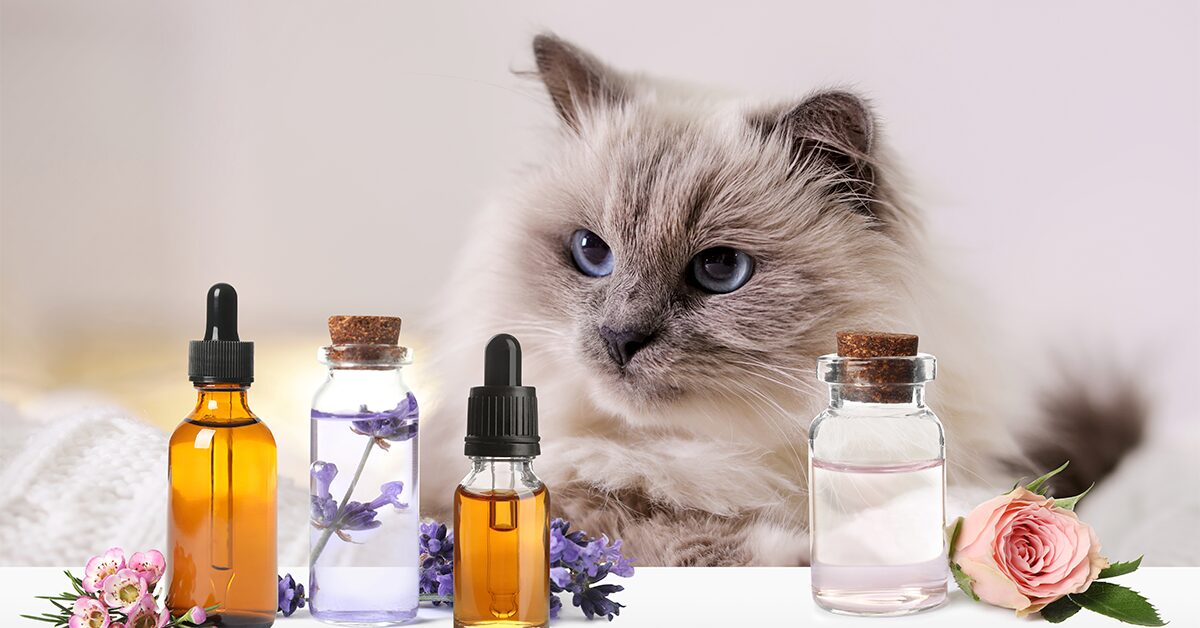Essential oils smell fantastic and have many positive benefits for us humans, from calming us down to promoting better wellness. Since they’re so widely used, you may be wondering if they have the same benefits and therapeutic effects for your kitty. Unfortunately, the risks of essential oils for cats are serious and outweigh the possible benefits.
Let’s take a closer look at the effects of essential oils on our cats.
What are essential oils?
Essential oils come from plants – they’re liquids made by pressing or steaming plant parts like the bark or flowers to obtain fragrance compounds from enzymes. It actually takes a large amount of plant matter to make one bottle of essential oil, so some essential oils are mixed with other ingredients to create the final product. Essential oils that have no other ingredients and are wholly extracted from plants are labeled “pure.”
How can we use essential oils?
The scent of essential oils is strong and highly concentrated, which makes them great for aromatherapy use. Aromatherapy is an ancient holistic technique that uses scents to promote healing in the mind and body. Different scents can do things like soothe pain, help with insomnia, and promote better immune health. For example, lavender essential oil is commonly used to reduce stress and anxiety.
Essential oils can also be applied to our skin to promote health benefits. Take tea tree oil – it has antibacterial and anti-inflammatory properties and is used in shampoos to treat dandruff.
Are essential oils safe for cats?
Essential oils have great benefits for humans, so cat parents may want to explore using them on cats with health problems – especially if other methods of treatment haven’t been working. But are they safe? In short – no.
Using essential oils poses serious risks to your cat. The safest thing to do is to never use them around your cat. If you do decide to use them, they should only be used sparingly and with great caution. We advise talking to your veterinarian and doing your research before attempting to use them.
The first problem with essential oils interacting with your kitty is that many common oils like peppermint, spearmint, geranium, ylang-ylang, bergamot, pennyroyal, and tea tree oil are poisonous for cats when ingested.
This means a lick of calming essential oil can cause major problems like difficulty breathing or respiratory distress for your cat – or worse, a call to a pet poison helpline and emergency trip to the vet. Never leave essential oils out in the open where they can be eaten, and never apply essential oils directly to your cat’s body.
Beyond this, essential oils used in diffusers or sprays (or air fresheners) can disperse small amounts of oil that are harmful if they collect on your cat’s body and fur. Cats are small creatures, and even a miniscule amount of diffused oil can harm them. This is because cats very quickly absorb essential oils through their skin, but their livers cannot get rid of those toxins, so essential oils can cause liver damage or even liver failure in large quantities. Essential oils can also cause damage to the central nervous system. And cats also self-groom, so if any drops of oil get on their fur it’s almost certain that they’ll lick and ingest those drops.
Your cat also has a strong sense of smell, and it’s hard for a pet parent like you to know how much of an essential oil will overwhelm them. Even a few drops of oil can create an overpowering smell that will agitate your cat and possibly upset their breathing or central respiratory system. This can have a serious impact on their health.
Another big issue with oils is that you often have to heat them to release their scent, and burning hot oil is a big no-no around our pets. If hot oil spills on them, your cat can get a painful heat burn and/or a chemical burn. If you’re heating your oil, keep it firmly out of reach of any prying snouts and paws that could knock it over.
Which essential oils should I avoid?
Here are some common oils that are proven to be toxic for cats:
- Cinnamon
- Citrus
- Clove
- Eucalyptus
- Peppermint
- Pine
- Sweet Birch
- Tea Tree
- Thyme
- Wintergreen
- Ylang Ylang
Which essential oils are safe to use?
Some pet-safe essential oils include:
- Chamomile oil
- Lavender oil
- Lemongrass oil
- Rose oil
To use essential oils safely, it’s important to highly dilute them to lower their phenol content. And remember: do not use any essential oils at all until you’ve consulted your veterinarian.
How do I know if my cat has eaten essential oils?
If your cat has eaten a toxic essential oil, there will be obvious signs. Be sure to pay close attention to distinguish between a cat coughing up a hairball, and a cat vomiting or in unusual distress. Look out for the following symptoms of essential oil poisoning:
- Smell of the oil on your cat’s fur and breath
- Redness in and around their mouth
- Breathing difficulties
- Drooling
- Fatigue
- Difficulty walking, or muscle tremors
- Agitation
- Pawing at their mouth or face
- Watery or irritated eyes and nose
- Vomiting or retching
If your cat is showing any of these symptoms, you need to act quickly and seek medical help.
What should I do if my cat eats essential oils?
If you know your cat has consumed essential oil – or they’re showing signs of poisoning – you need to seek help immediately. Take your cat to your nearest veterinarian or emergency veterinary hospital or call ASPCA animal poison control (which is open 24/7). They can tell you what you should do next.
Your vet may perform a physical exam and run a blood test to measure your cat’s level of toxic ingestion. They will want to see if the poisoning has affected your cat’s liver. Take the oil product with you to the vet to help them understand what they’re dealing with. They may try to help your cat breathe with oxygen support, insert an IV drip, or otherwise try to remove the toxins. Luckily, the faster you seek treatment, the better your cat’s chances of recovery.
If you ever have to cope with an emergency like this, it can be priceless to know you have help saying ‘yes’ to the treatment your cat needs. With a Pumpkin plan, you can have peace of mind.
How can I keep my cat safe around essential oils?
Even if you don’t use them on your cat, you may have essential oils around your house. Here are some key tips for keeping your cat safe around essential oils:
- Keep lids tightly closed on all oil bottles
- Keep them safe and out of reach of your cat, either locked away or in a pet-inaccessible location
- If using an oil diffuser, use only in a large, well-ventilated area
- When burning oils, don’t put them on surfaces a cat could easily reach
- Thoroughly clean surfaces that essential oils have touched
- Make sure everyone who comes into contact with your cat knows that essential oils are potentially harmful and must be treated with care
Final thoughts
It’s difficult to use essential oils in a way that is 100% safe for your cat, and there are many risks to consider. If you decide to use them, you must take extra precautions and be vigilant at all times. The absolute best thing to do is consult your vet before even attempting to use essential oils – your kitty will thank you for it!




